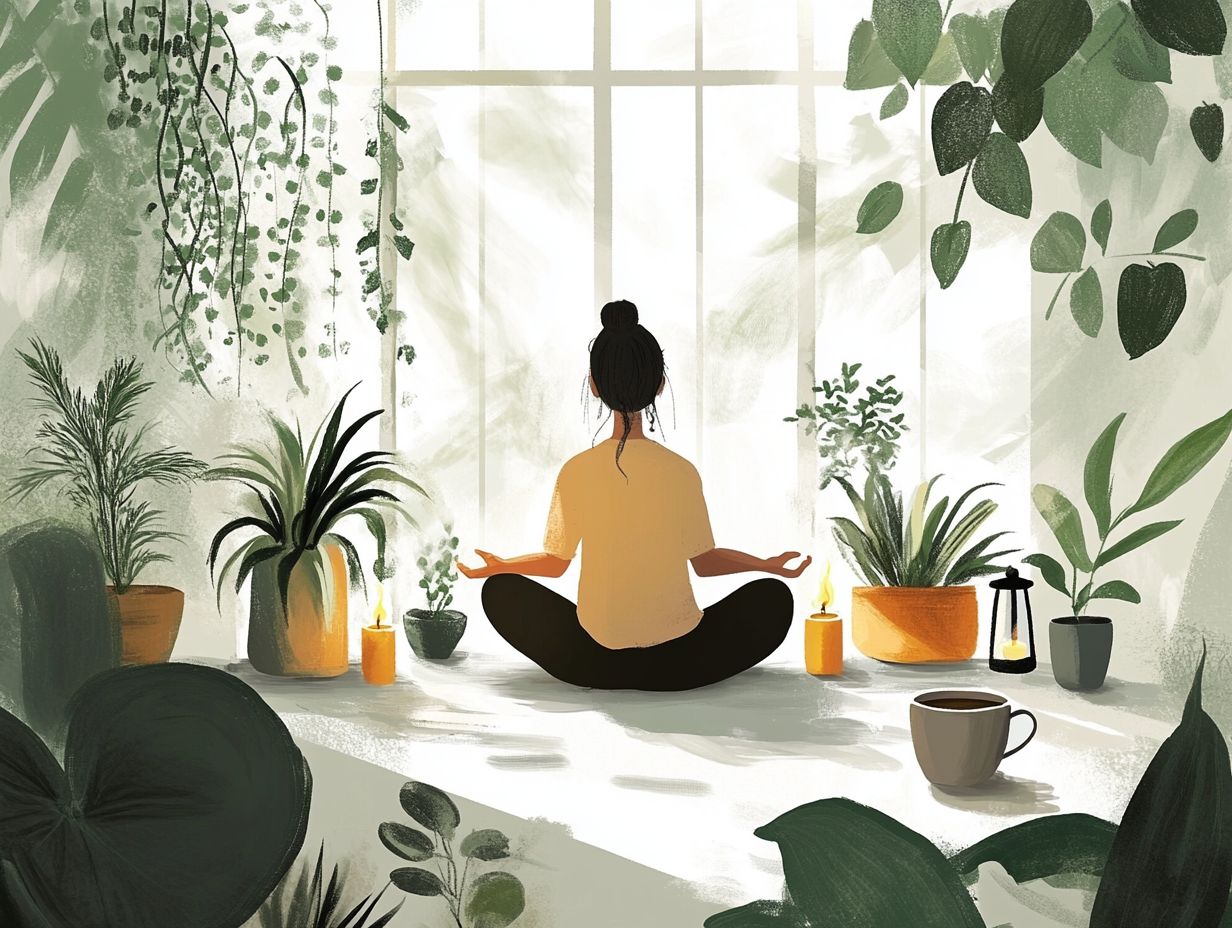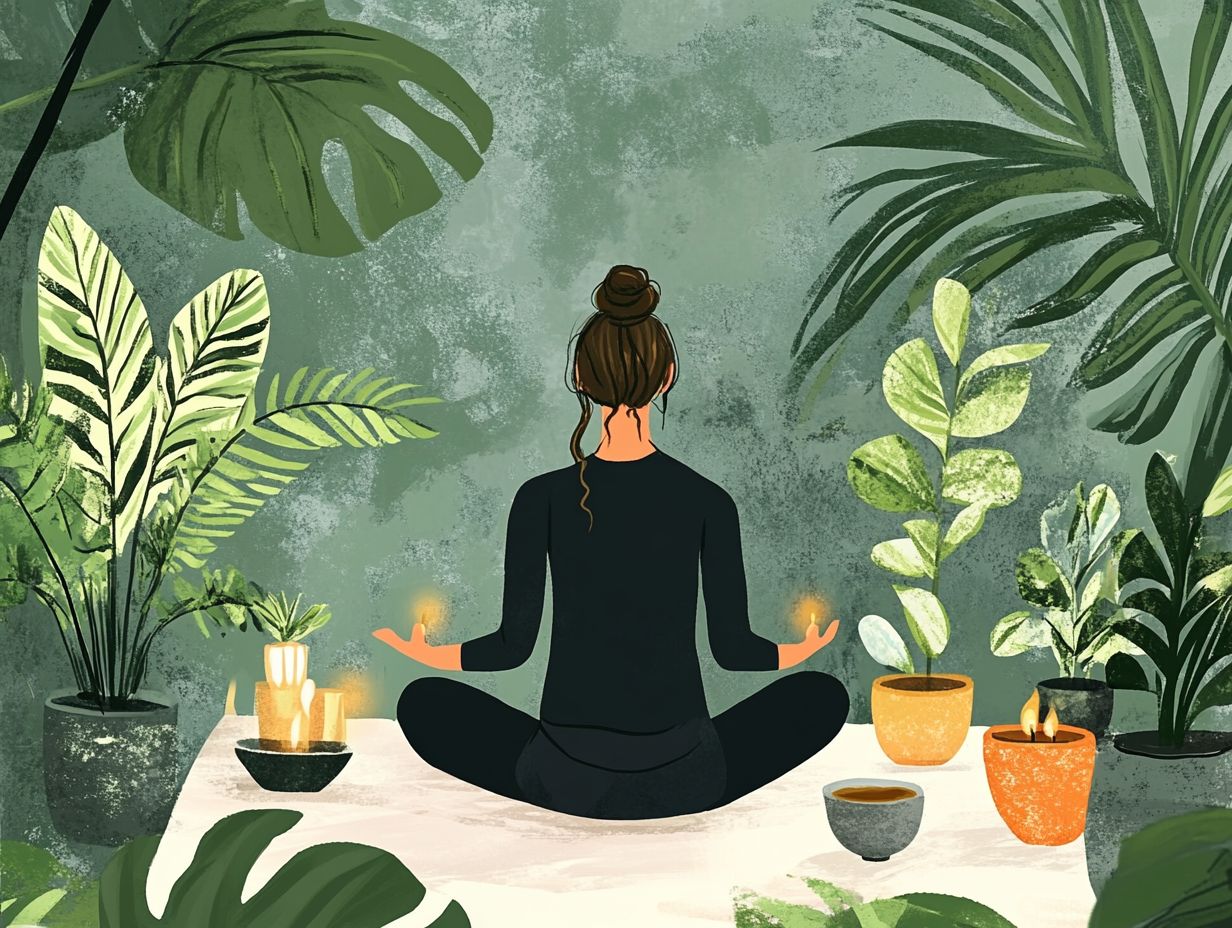How to Cultivate Patience Through Self-Care
In the whirlwind of today s fast-paced world, patience may seem like a luxury you can’t afford. However, embracing this virtue is not just beneficial for your well-being; it s essential for effective self-care and character building.
This exploration delves into the essence of patience, its profound significance for mental health and relationships, and practical strategies you can employ to cultivate it within your self-care regimen, including the development of emotional regulation skills and managing thinking patterns.
From practicing mindfulness to enhancing your communication skills, you’ll uncover how nurturing patience can elevate your daily experiences, enrich your interactions with others, and contribute to physiological effects such as reduced cortisol levels.
Contents
- Key Takeaways:
- What is Patience?
- Why is Cultivating Patience Important for Psychological Resilience?
- Other Strategies for Cultivating Patience
- How to Cultivate Patience Through Self-Care
- Frequently Asked Questions
- What is self-care and how can it help me cultivate patience?
- How can I incorporate self-care into my daily routine to improve my patience?
- What are some self-care practices that specifically help with cultivating patience?
- How can practicing self-care help me manage my emotions and reactions?
- Are there specific self-care techniques that can help in moments of impatience?
- How can I stay motivated to practice self-care regularly for cultivating patience?
Key Takeaways:

- Patience is the ability to stay calm and persevere in difficult situations. It is closely linked to self-care as it allows us to take care of ourselves, manage stress effectively, and develop better frustration tolerance.
- Cultivating patience is crucial for our mental health and relationships. Impatience can lead to increased stress, anxiety, and strained relationships.
- Mindfulness, rest, relaxation techniques, and self-care activities are effective ways to cultivate patience. Other strategies include practicing gratitude, reframing negative thoughts, setting realistic expectations, communicating effectively, and engaging in anger management techniques.
What is Patience?
Patience is your capacity to endure challenging situations or wait for results without succumbing to frustration or anxiety. It plays a pivotal role in emotional regulation, stress reduction, and overall mental well-being.
This essential quality is a cornerstone of mindfulness practices. It allows you to cultivate emotional awareness and self-regulation in your daily life, ultimately contributing to your personal growth, decision making, and the health of your relationships.
By honing your patience, you enhance your ability to manage cognitive biases that lead to impulsive reactions. This also helps you develop a greater sense of acceptance in the face of adversity.
How is Patience Related to Self-Care and Cognitive Biases?
Patience is intrinsically tied to self-care, as cultivating this virtue gives you the power to practice self-compassion and enhance your emotional awareness. This ultimately leads to improved mental health and character building. By engaging in mindful practices, you foster a deeper understanding of your emotions, enabling you to develop better coping strategies for the stress and frustrations that arise in daily life.
Incorporating activities such as meditation, journaling, or gentle yoga into your routine creates essential space for reflection and self-discovery. These self-care practices not only promote relaxation but also serve as powerful tools for developing emotional regulation and problem-solving skills. For instance, when you practice deep-breathing exercises during moments of anger or anxiety, you create a pause that allows for a more thoughtful response rather than an impulsive reaction.
Showing kindness to yourself through positive affirmations or guided imagery can significantly strengthen your self-compassion, nurturing a more patient and resilient mindset as you face life s challenges.
Why is Cultivating Patience Important for Psychological Resilience?
Cultivating patience is essential for you to achieve long-term goals and build psychological resilience. It provides you with the emotional regulation skills needed to navigate life s challenges effectively while fostering situational awareness and creative solutions.
In a world that thrives on instant gratification, your ability to pause, reflect, and practice acceptance can remarkably reduce stress and enhance your mental health. Embrace this approach to unlock a more fulfilling and balanced life right now! This approach allows you to savor each moment rather than rush through them, while also improving time management and tolerance levels.
How Does Impatience Affect Our Mental Health and Stress Levels?
Impatience can take a toll on your mental health, often leading to increased stress, frustration, and emotional turmoil that can worsen any existing negative feelings. When patience runs thin, your tolerance for frustration diminishes, and you may find yourself reacting impulsively. This can complicate your ability to communicate effectively, solve problems, and manage negative emotions.
This emotional upheaval can create a cycle that makes it increasingly difficult to manage daily responsibilities and nurture relationships. When you feel overwhelmed by impatience, anxiety levels can spike, leaving you struggling to maintain your composure and hindering your ability to engage in healthy social interactions.
Dealing with impatience requires conscious efforts to develop patience. Consider incorporating coping strategies such as mindfulness practices, deep breathing exercises, and setting realistic expectations into your routine. By embracing these approaches, you can cultivate a more balanced emotional state, ultimately enhancing your mental well-being and improving your interactions with others.
How Does Impatience Affect Our Relationships?

Impatience can profoundly undermine the foundation of healthy relationships, chipping away at your communication skills and emotional intelligence, which leads to misunderstandings and conflict. When you grapple with impulse control, it s all too easy to react without considering how your words and actions affect those around you. This results in interactions that feel strained and reduces the clarity of thought needed for meaningful dialogue.
This lack of restraint doesn’t just emerge as sharp words; it can also show up in dismissing body language, creating an atmosphere where meaningful dialogue gives way to frustration and resentment. The ability to manage your emotions is essential for building relationships, enabling you to respond thoughtfully instead of reacting impulsively.
Embracing mindfulness techniques like deep breathing or focused meditation can significantly improve your capacity to stay present and calm in social situations. This fosters patience and minimizes the chances of conflict. By cultivating this awareness, you can approach conversations with a clearer mindset, ultimately enriching your relationships.
How to Cultivate Patience Through Self-Care
Imagine transforming your daily challenges into stepping stones for personal growth. Cultivating patience through self-care can make this a reality! This approach means embracing mindfulness practices and calming techniques within your daily routines. It not only enhances your ability to manage your emotions but also nurtures a deeper sense of acceptance when faced with life s challenges, promoting self-improvement and personal development.
By prioritizing self-care activities, you intentionally carve out space for patience to thrive, ultimately paving the way for improved mental health and meaningful personal growth.
1. Practice Mindfulness and Emotional Regulation
Practicing mindfulness is a powerful approach to cultivating patience, as it fosters emotional awareness and helps you stay anchored in the present moment. This effectively reduces stress and impulsive reactions. By employing mindful breathing techniques, you can enhance your self-regulation, allowing for greater tolerance in challenging situations and better management of behavior patterns.
Incorporating straightforward yet impactful meditation practices, like body scans and loving-kindness meditation, can significantly amplify these benefits. These techniques guide you to focus on your bodily sensations while nurturing a sense of compassion for yourself and others.
Consistently practicing mindfulness helps you handle stress better. It supports your emotional stability, leading to healthier relationships with others. This practice helps you develop patience. You’ll learn to respond thoughtfully instead of reacting impulsively, transforming your daily experiences into valuable opportunities for growth and resilience.
2. Take Breaks and Rest
Taking regular breaks and allowing yourself time to rest is crucial for emotional regulation. Fatigue can amplify feelings of impatience and frustration.
Integrating short breaks into your daily routine can help you recharge. This allows you to tackle challenges with a fresh perspective, a sense of calm, and enhanced patience skills.
In today’s fast-paced world, the significance of these pauses is immense. They provide vital moments to step back and reflect on your experiences.
By implementing effective breaks, you give your mind a chance to unwind from the relentless demands of daily responsibilities. To foster a culture of patience in your life, consider scheduling specific times throughout the day dedicated solely to relaxation.
This could mean stepping away from screens, taking a leisurely walk, or engaging in mindfulness practices. These small yet powerful habits enhance your focus and strengthen your emotional resilience.
They enable you to navigate stress with greater ease, improve your situational awareness, and maintain a balanced perspective amidst life’s uncertainties.
3. Engage in Relaxation Techniques
Engaging in relaxation techniques is essential for your emotional regulation and stress reduction. These practices foster a sense of calm and enhance your ability to navigate life’s challenges.
Techniques like a technique where you tense and relax different muscle groups, visualizing calming scenes to relax your mind, and yoga can play a significant role in cultivating patience and improving decision-making.
By incorporating these practices into your daily self-care routine, you create a sanctuary of tranquility amidst the chaos of modern life. For example, setting aside just a few minutes each day for deep breathing exercises can ground you and help refocus your thoughts.
This aids in anger management and reduces stress. Similarly, practicing mindfulness through meditation allows your mind to stay present, alleviating anxiety about future uncertainties.
When you regularly engage in these relaxation strategies, you not only become more adept at managing stress but also cultivate an inner resilience that nurtures patience over time.
This ultimately leads to enhanced emotional health and well-being.
4. Prioritize Self-Care Activities

Prioritizing self-care activities is essential for cultivating patience. It fosters emotional awareness and promotes self-compassion both vital components for your personal growth.
Engaging in fulfilling self-care routines helps you develop a positive mindset and enhances your overall well-being. To truly understand the impact of self-care, recognizing how it lays the groundwork for emotional resilience amidst life’s challenges is important.
Simple practices, such as dedicating time to meditation, journaling about your feelings, or even enjoying nature walks, can significantly boost your self-awareness.
These actions not only provide you with a much-needed break from daily stressors but also create nurturing opportunities to reflect on your thoughts and emotions.
By embracing these self-reflective moments, you cultivate a deeper understanding of your emotional triggers. This allows you to respond with patience rather than frustration when facing adversity.
Other Strategies for Cultivating Patience
Incorporating self-care practices into your routine is just the beginning. There are countless strategies available for cultivating patience that can significantly enhance your emotional regulation and strengthen your interpersonal relationships.
Techniques such as practicing gratitude, reframing negative thoughts, and honing your communication skills play a pivotal role in developing both patience and emotional intelligence.
By embracing these approaches, you can foster a more balanced and resilient emotional landscape.
How to Cultivate Patience Through Self-Care
In our fast-paced world, cultivating patience is essential for emotional well-being and resilience. This article explores practical strategies to enhance your patience through self-care practices.
1. Practice Gratitude
Practicing gratitude can profoundly enhance your patience. It nurtures emotional awareness and encourages a positive outlook on life, enabling you to truly appreciate the present moment.
By regularly reflecting on what you are grateful for, you cultivate self-compassion and diminish feelings of impatience. This subtle shift in focus allows you to navigate challenges with a greater sense of calm and resilience.
Integrating gratitude practices into your daily routine can be both simple and rewarding. Start a gratitude journal today and transform your outlook! Write down three things you are thankful for each day. This practice helps you develop a more appreciative mindset.
Another effective exercise involves dedicating a few minutes each evening to meditate on positive experiences. This practice solidifies your emotional resilience. You might also find that incorporating simple verbal affirmations of gratitude into your conversations promotes a spirit of appreciation and mindfulness throughout your day.
2. Reframe Negative Thoughts
Reframing negative thoughts is a powerful strategy for nurturing patience. It encourages you to view challenges through a more constructive lens, enhancing your emotional intelligence and self-regulation.
This process involves changing how you think about situations to improve your response. By shifting the narrative surrounding difficult situations, you can reduce stress and cultivate a sense of control over your emotions.
For example, when frustrations arise, instead of feeling helpless, break down the problem and identify potential solutions. Journaling creates a safe space to explore your thoughts. It helps you develop a positive outlook.
Practicing mindfulness techniques like deep breathing or meditation can ground you, fostering a deeper sense of patience. Integrating these strategies into your daily routine can transform the way you perceive and manage challenges, leading to improved emotional regulation.
3. Set Realistic Expectations
Setting realistic expectations is crucial for cultivating patience. It enables you to manage frustration and enhances your emotional regulation in daily life.
For instance, when faced with a long-term project, break it down into smaller, manageable milestones instead of expecting immediate results. This approach eases feelings of being overwhelmed and lets you celebrate small victories along the journey.
Practicing gratitude for every bit of progress, no matter how minor, can significantly strengthen your emotional resilience. Establish timeframes that respect life s unpredictability, helping to reduce anxiety while encouraging a kinder perspective toward yourself and others.
4. Communicate Effectively

Effective communication is essential for cultivating patience, as it hinges on emotional awareness and a commitment to building healthy relationships. By honing your communication skills, you can articulate your needs more clearly, minimizing misunderstandings that might otherwise fuel impatience.
When you engage in open dialogue, you foster an environment where emotions are shared and validated, paving the way for deeper understanding. This understanding tempers your reactions and enhances your resilience during challenging discussions.
To elevate your communication skills, practice active listening, ensuring the speaker feels heard and valued. Embrace ‘I’ statements instead of ‘you’ accusations to transform the conversation into a more constructive exchange.
Equally important is maintaining emotional awareness. By recognizing your feelings, you can respond thoughtfully rather than impulsively, fostering patience and collaboration in your interpersonal interactions.
Frequently Asked Questions
Here we address some common questions related to cultivating patience through self-care practices.
In conclusion, cultivating patience is a journey that requires practice and commitment. By incorporating gratitude, reframing negative thoughts, setting realistic expectations, and communicating effectively, you can significantly enhance your emotional resilience and foster a more patient mindset.
What is self-care and how can it help me cultivate patience?
Self-care means taking intentional steps to look after your physical, emotional, and mental health. By prioritizing self-care, you can manage stress better, which leads to greater patience and resilience.
How can I incorporate self-care into my daily routine to improve my patience?
Start small by dedicating a few minutes each day to activities that bring you joy, like taking a walk or reading. Gradually increase the time for these enjoyable activities until they become routine.
What are some self-care practices that specifically help with cultivating patience?
Journaling, getting enough sleep, and deep breathing exercises are effective ways to build patience. Setting boundaries and learning to say no can also help reduce stress.
How can practicing self-care help me manage my emotions and reactions?
Self-care allows you to focus on your own needs. This focus helps you manage emotions better, leading to a calmer, more patient mindset.
Are there specific self-care techniques that can help in moments of impatience?
When you feel impatience, try grounding techniques like deep breathing or counting to 10. Reminding yourself to stay present and practicing gratitude can also shift your mindset.
How can I stay motivated to practice self-care regularly for cultivating patience?
Remember, self-care is an ongoing journey that requires your commitment. Set achievable goals and celebrate your small victories!






